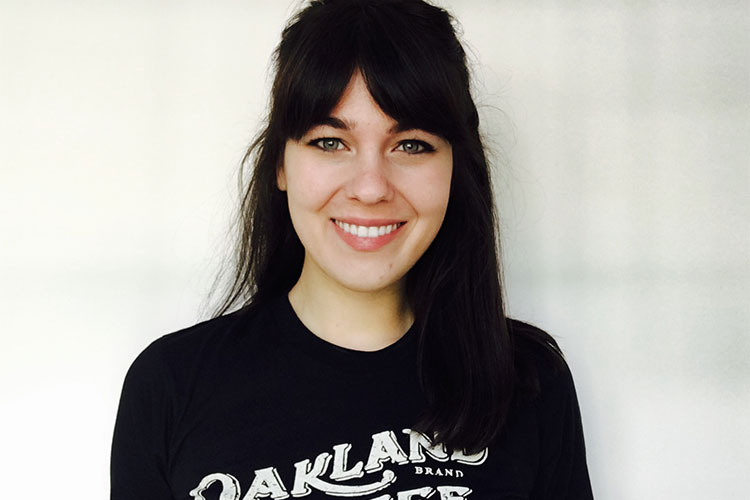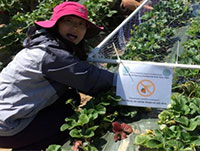Learning from the ground up
From well-established student farms at UC Davis and UC Santa Cruz to a crop of new gardens, courses and programs emerging across the UC system, the university is offering experiential learning opportunities to students at all levels.

March 30, 2016
For Kate Kaplan, the UC Berkeley Student Organic Garden Association provided a place to grow food, nurture her interest in sustainability and create a career path that’s building a buzz.
She served as a student manager of the garden, advocated for a food systems minor as an undergraduate representative and compiled information about experiential learning in the University of California system as a UC Global Food Initiative student fellow, working with the Berkeley Food Institute.

Kate Kaplan (UC photo)
After graduating in 2015, Kaplan is putting what she learned into practice as executive director for Oakland Coffee Works, a new organic coffee company founded by Green Day’s Billie Joe Armstrong and Mike Dirnt.
“The definition of experiential learning is ‘learning by doing’ and trying things out,” Kaplan said. “That’s what I do all day with this job. We’re learning from the ground up.”
From well-established student farms at UC Davis and UC Santa Cruz to a crop of new gardens, courses and programs emerging across the UC system, the university is offering experiential learning opportunities to students at all levels. This hands-on learning offers invaluable real-world experience to students, diversifying their skills, providing leadership development and helping prepare them for successful careers.

Experiential learning at UC
The Global Food Initiative’s Experiential Learning subcommittee has produced a directory of UC experiential learning courses and programs that have experiential components in food and agriculture systems; a report with lessons learned, best practices and case studies titled “Learning From the Ground Up”; and released several related student-produced videos. More information on students’ experiential learning work with the Berkeley Food Institute can be read here. The report’s authors include Kate Kaplan, Jennifer Sowerwine and Ann Thrupp, UC Berkeley; Mark Van Horn, UC Davis; and Damian Parr, UC Santa Cruz.
Overall, UC offers more than 200 courses and 150 programs related to experiential learning in food and sustainable agriculture systems. For example, farms and gardens provide diverse opportunities for students to participate in activities related to food, nutrition, research, education and outreach, according to a new Global Food Initiative report. The report, co-authored by Kaplan and colleagues at UC Berkeley, UC Davis and UC Santa Cruz, highlights best practices, lessons learned and case studies of experiential learning across the UC system.
“I hope it will show students existing programs on other campuses they might want on their campuses,” Kaplan said. “We don’t have to reinvent the wheel at every campus.”
UC Berkeley, which has at least 30 courses and 26 programs related to experiential learning in food and sustainable agriculture systems, launched a food systems minor last fall. As part of the minor, students complete a community engagement project in their junior or senior year to bring together what they have learned in a real-world setting.
Such “learning beyond the classroom” is a key element of the educational experience, said Ann Thrupp, executive director of the Berkeley Food Institute, which helped develop the food systems minor. BFI also has a program supporting student fellowships for community engagement and other experiential learning opportunities. Thrupp is also a co-leader of the Global Food Initiative subcommittee that produced the new experiential learning report and directory, and one of the co-authors of the report.
Kaplan is busy continuing her learning beyond the classroom. She’s helping to build Oakland Coffee Works, an organic coffee company that launched two months ago. It’s the first coffee company to use only fully compostable-packaged products, including 12 ounce coffee bags and, coming soon, single-serve coffee cups, she said. It also has a charitable arm that supports the communities where its coffee is grown.
“We’re trying to take the values that Oakland stands for – quality and sustainability – and make that available for people all over the country,” Kaplan said. “(Armstrong and Dirnt) really care about this company. They would not go to all this trouble if they did not believe in it. It’s been really inspiring.”